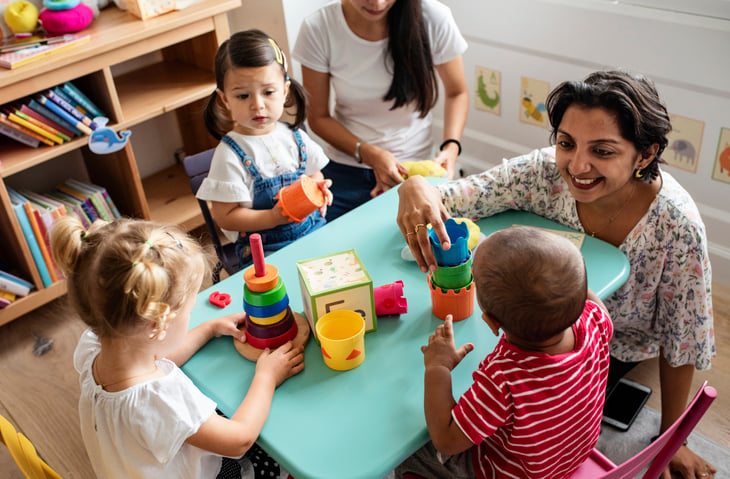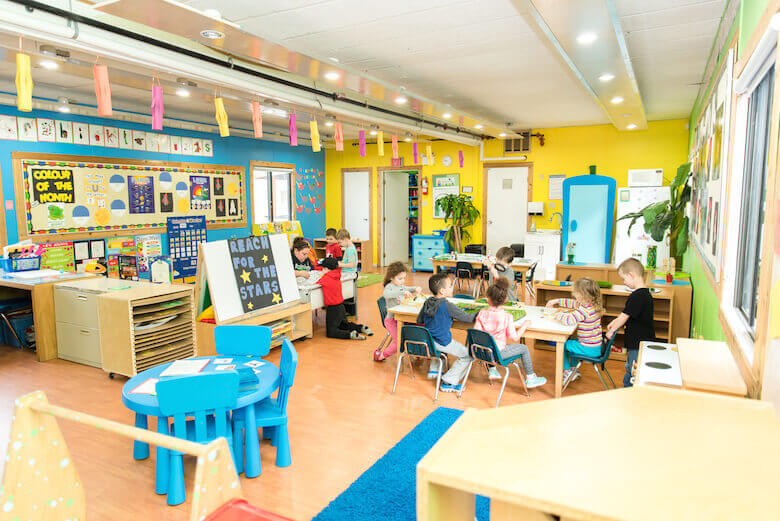Why Parents Rely On A Professional Child Care Center For Their Children
Wiki Article
The Role of DAYCARE in Fostering Social Abilities and Very Early Discovering
Day care offers as a considerable atmosphere for young kids, promoting essential social communications that advertise very early discovering. In this organized setup, children involve with caretakers and peers, developing important interaction and participation skills. As they navigate play and numerous activities, they find out to settle conflicts and develop emotional knowledge. Recognizing the nuances of these communications reveals the profound impact childcare carries a child's advancement, shaping their future connections and academic preparedness. What specific skills do children acquire in this setting?The Relevance of Social Communication in Day Care
While lots of moms and dads recognize the significance of very early childhood education, the function of social interaction in day care is commonly underestimated. Day care setups provide children with invaluable chances to involve with peers, promoting crucial social skills. Throughout these formative years, youngsters discover to navigate numerous social dynamics, such as sharing, teamwork, and dispute resolution. Communicating with varied age and personalities enhances their capacity to adjust to different settings and develop empathy in the direction of others.
Structure Interaction Abilities Via Play
Play acts as a powerful tool for youngsters to construct vital communication skills in daycare settings. Through different play tasks, youngsters talk, share their ideas, and find out to listen to others. Parlor games, as an example, urge them to utilize language in various contexts, advertising vocabulary expansion and understanding of social hints.
Narration throughout playtime permits youngsters to share concepts and feelings, assisting them establish narrative skills and self-confidence in their verbal expressions. Overall, play not only acts as a pleasurable activity but also as a necessary platform for establishing the communication skills needed for effective social communications in later life.
Motivating Participation and Synergy
Participation and team effort are crucial skills that kids can cultivate in day care atmospheres. Via various group tasks, such as developing jobs or joint video games, children discover to share responsibilities and pursue usual goals. These communications promote an understanding of the significance of listening to others, negotiating roles, and jeopardizing when essential.In day care setups, caregivers usually produce chances for children to participate in synergy by urging them to take part in team tasks. This not only helps youngsters create social bonds yet likewise grows a feeling of belonging and community.
As they navigate these cooperative experiences, kids gain important understandings into the dynamics of dealing with peers. They find out to appreciate varied point of views and identify that each member adds uniquely to the team effort. Ultimately, these early lessons in teamwork and team effort lay the foundation for much healthier relationships and effective cooperation in future social and academic settings.
Structured Learning Activities and Cognitive Development
Structured understanding activities play an essential duty in cultivating cognitive development in young kids (Childcare Near Me). These tasks, Find Out More that include problems, storytelling, and hands-on experiments, boost important thinking and analytical abilities. In a daycare setup, organized discovering urges youngsters to engage with their peers, enhancing their ability to process information and comprehend different principles
With led play and interactive tasks, youngsters develop foundational skills such as numeracy and proficiency. For example, tasks focused around numbers can assist kids understand mathematical concepts, while narration improves language procurement and understanding. Additionally, structured understanding enables instructors to analyze developing progression and dressmaker tasks to private discovering needs.

Integrating a varied variety of structured tasks not only advertises cognitive growth however likewise prepares kids for future scholastic success. By providing a well balanced atmosphere that cultivates exploration and inquiry, day care programs play a vital role in shaping the cognitive capacities of young learners.
Cultivating Psychological Intelligence and Confidence
Emotional intelligence and confidence are important parts of a kid's development, enhancing the cognitive skills cultivated with structured understanding tasks. In day care settings, children are supplied with opportunities to share their emotions and take part in social communications, which are critical for constructing psychological recognition. With directed play and group activities, children discover to determine their sensations, acknowledge those of others, and establish compassion.Interaction with caregivers and peers aids to cultivate self-esteem and resilience. Favorable support and inspiration from grownups empower children to take threats and face challenges, fostering a feeling of accomplishment. As they browse social characteristics, children construct confidence in their abilities to connect, team up, and solve problems - Childcare North York. This caring atmosphere enables for the recommended you read progressive advancement of emotional knowledge, which is important for future social relationships and overall well-being. As an outcome, day care plays a significant role in fostering both psychological intelligence and confidence in young youngsters
Often Asked Concerns
Just How Can Parents Select the Right Daycare for Their Child?
Parents need to consider variables such as place, staff credentials, security criteria, educational program, and evaluates from other moms and dads when selecting the best childcare for their child, ensuring it lines up with their kid's developmental needs and family values.
What Age Is Finest for Starting Childcare?
:max_bytes(150000):strip_icc()/GettyImages-956997658-af489cbf5e3b4a2cbe26e2e78016a0a2.jpg)
Just How Does Childcare Impact Kid's Actions in the house?
Childcare typically positively influences youngsters's habits at home by enhancing social abilities, promoting freedom, and encouraging psychological guideline (Childcare North York). As a result, youngsters might show enhanced communication and teamwork, resulting in even more harmonious household characteristicsExist Any Type Of Downsides to Daycare Attendance?
Yes, there are downsides to daycare attendance, consisting of potential splitting up stress and anxiety, direct exposure to ailments, and inconsistent caregiving. These variables can impact a kid's emotional health and modification in the house, affecting overall household dynamics.How Can Moms And Dads Support Social Skills Discovered at Day Care?
Parents can sustain social skills discovered at day care by promoting playdates, encouraging participating activities, modeling favorable communications, reviewing sensations, and strengthening sharing and communication at home, thereby improving their child's social development and self-confidence.Childcare offers as a substantial environment for young kids, promoting important social communications that advertise very early discovering. Daycare setups give youngsters with very useful opportunities to engage with peers, promoting crucial social abilities. Play serves as a powerful tool for youngsters to construct critical communication skills in daycare settings. In childcare settings, youngsters are given with chances to share their feelings and engage in social communications, which are essential for developing emotional understanding. Day care commonly positively influences children's habits at home a knockout post by improving social abilities, promoting self-reliance, and motivating psychological policy.
Report this wiki page